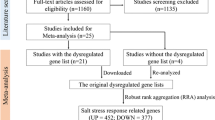Abstract
Salt stress is a common abiotic stress in agricultural production, which is affected by multiple genes and environmental factors. Although transcriptome analyses have detected some salt-related genes in Arabidopsis thaliana, these genes are often major genes and can not adequately explain the molecular mechanism of salt tolerance. Some genes related to salt stress, but does not reach significant threshold in gene expression analysis (called modest effect genes), are often ignored. Therefore, we took full account of the role of modest effect genes and performed a pathway-based analysis of three gene microarray datasets to identify the pathways related to salt stress. We also compared these results with the pathways identified by major genes. Finally, three pathways were identified as salt-related pathways, some of which were previously reported to be related to salt stress in plants, while others are novel. These findings will help us to study the molecular mechanism of salt stress, but also provide a new perspective for the study of salt tolerance in Arabidopsis thaliana.

Similar content being viewed by others
References
Liu Y, Ji X, Zheng L, Nie X, Wang Y (2013) Microarray analysis of transcriptional responses to abscisic acid and salt stress in Arabidopsis thaliana. Int J Mol Sci 14:9979–9998
Kawaura K, Mochida K, Ogihara Y (2008) Genome-wide analysis for identification of salt-responsive genes in common wheat. Funct Integr Genom 8:277–286
Wang J, Chen L, Wang Y, Zhang J, Liang Y et al (2013) A computational systems biology study for understanding salt tolerance mechanism in rice. PLoS One 8:e64929
Shameer K, Ambika S, Varghese SM, Karaba N, Udayakumar M et al (2009) STIFDB-Arabidopsis stress responsive transcription factor database. Int J Plant Genom 2009:583429
Borkotoky S, Saravanan V, Jaiswal A, Das B, Selvaraj S et al (2013) The Arabidopsis stress responsive gene database. Int J Plant Genom 2013:949564
Naika M, Shameer K, Sowdhamini R (2013) Comparative analyses of stress-responsive genes in Arabidopsis thaliana: insight from genomic data mining, functional enrichment, pathway analysis and phenomics. Mol Biosyst 9:1888–1908
Lai L, Liberzon A, Hennessey J, Jiang G, Qi J et al (2012) AraPath: a knowledgebase for pathway analysis in Arabidopsis. Bioinformatics 28:2291–2292
Yi X, Du Z, Su Z (2013) PlantGSEA: a gene set enrichment analysis toolkit for plant community. Nucleic Acids Res 41:W98-103
Hartmann L, Pedrotti L, Weiste C, Fekete A, Schierstaedt J et al (2015) Crosstalk between two bZIP signaling pathways orchestrates salt-induced metabolic reprogramming in Arabidopsis roots. Plant Cell 27:2244–2260
Allu AD, Soja AM, Wu A, Szymanski J, Balazadeh S (2014) Salt stress and senescence: identification of cross-talk regulatory components. J Exp Bot 65:3993–4008
Guan Q, Wu J, Yue X, Zhang Y, Zhu J (2013) A nuclear calcium-sensing pathway is critical for gene regulation and salt stress tolerance in Arabidopsis. PLoS Genet 9:e1003755
Kanehisa M, Goto S (2000) KEGG: kyoto encyclopedia of genes and genomes. Nucleic Acids Res 28:27–30
Wixon J, Kell D (2000) The Kyoto encyclopedia of genes and genomes–KEGG. Yeast 17:48–55
Ramanan VK, Shen L, Moore JH, Saykin AJ (2012) Pathway analysis of genomic data: concepts, methods, and prospects for future development. Trends Genet 28:323–332
Peng G, Luo L, Siu H, Zhu Y, Hu P et al (2010) Gene and pathway-based second-wave analysis of genome-wide association studies. Eur J Hum Genet 18:111–117
Jia P, Zheng S, Long J, Zheng W, Zhao Z (2011) dmGWAS: dense module searching for genome-wide association studies in protein-protein interaction networks. Bioinformatics 27:95–102
Liu G, Zhang F, Jiang Y, Hu Y, Gong Z et al (2017) Integrating genome-wide association studies and gene expression data highlights dysregulated multiple sclerosis risk pathways. Mult Scler 23:205–212
Roy K, Chanfreau G (2014) Stress-induced nuclear RNA degradation pathways regulate yeast bromodomain factor 2 to promote cell survival. PLoS Genet 10:e1004661
Deng Y, Srivastava R, Howell SH (2013) Endoplasmic reticulum (ER) stress response and its physiological roles in plants. Int J Mol Sci 14:8188–8212
Liu J, Qiao Q, Cheng X, Du G, Deng G et al (2016) Transcriptome differences between fiber-type and seed-type Cannabis sativa variety exposed to salinity. Physiol Mol Biol Plants 22:429–443
Acknowledgements
This work was supported in part by Grant from the National Natural Science Foundation of China (Grant No. 81601422).
Author information
Authors and Affiliations
Corresponding authors
Ethics declarations
Conflict of interest
The authors declare no conflicts of interest.
Rights and permissions
About this article
Cite this article
Zhang, M., Mu, H., Zhang, R. et al. Genome-Wide Pathway Analysis of Microarray Data Identifies Risk Pathways Related to Salt Stress in Arabidopsis Thaliana. Interdiscip Sci Comput Life Sci 10, 566–571 (2018). https://doi.org/10.1007/s12539-018-0288-1
Received:
Revised:
Accepted:
Published:
Issue Date:
DOI: https://doi.org/10.1007/s12539-018-0288-1




